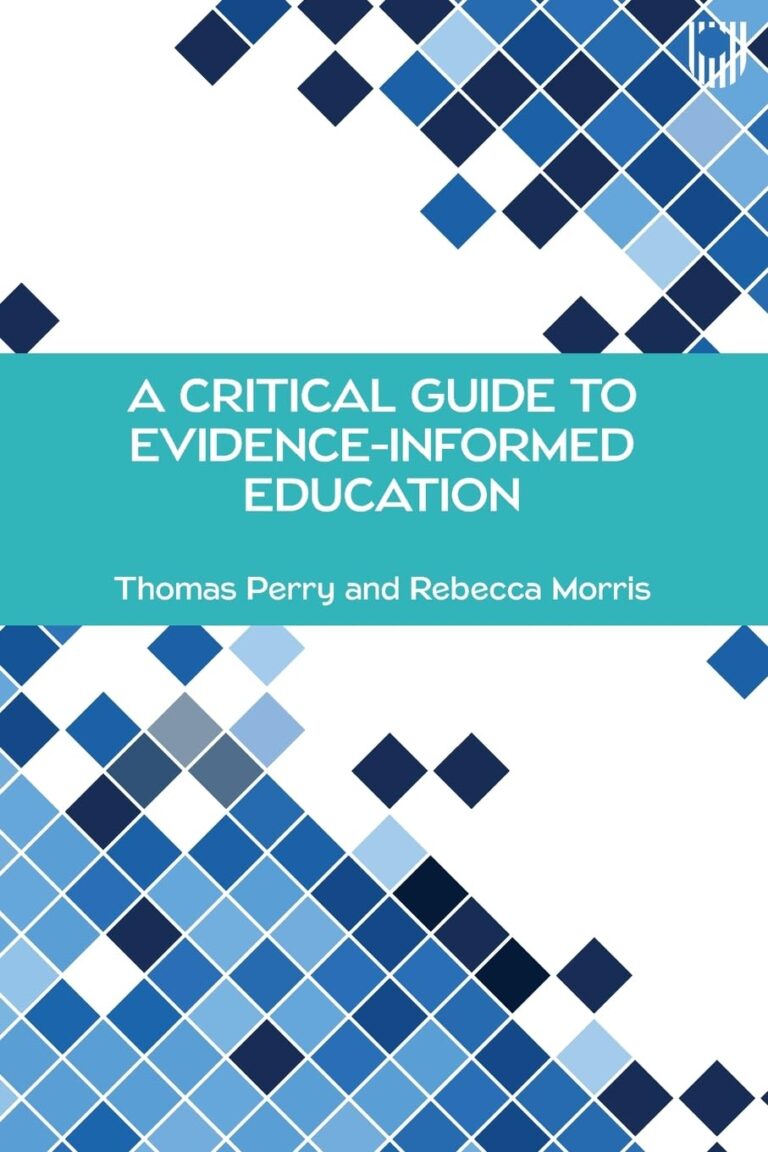
Mosaic Book of the Term Prize Draw
Summer 2024

Written by Rob Caudwell, Co-Founder of Penrose Education
7 June 2024
At Penrose Education we are on a mission to fill the (teacher development) world with thoughtfully designed and effective EdTech. But we also want to fill the (teacher development) world with books.
Each term we will be reviewing a book we have found helpful, interesting and/or thought-provoking in our attempts to develop our understanding of what exceptional teacher training looks like.
Best of all – you could win a copy of one of these books in our Book of the Term Prize Draw!
Our chosen book this term is: A Critical Guide to Evidence-Informed Education, by Thomas Perry and Rebecca Morris.
Why we chose this book?
In their recent working paper “Revisiting the notion of teacher professionalism”, Dr Lisa-Maria Müller & Dr Victoria Cook (from the Chartered College of Teaching, an organisation we are proud to be partnered with) set out a compelling call to reconsider what “evidence-informed practice” means within a broader understanding of teacher professionalism. In her introduction to the paper, Dame Alison Peacock expresses concern that too often notions of evidence-informed practice are misused – diminishing, or even denying, the important role a teacher must have in “interpreting and applying evidence to their contexts”. Müller and Cook conclude the paper saying that teachers should “be encouraged to become critical research consumers who question and adapt research evidence before adopting it for their contexts”.
In their appropriately-named book, Thomas Perry and Rebecca Morris outline the key challenges faced by those in education who are seeking to be critical consumers of research. The book first helps its readers to understand what educational research actually is. It then maps out some of the prevailing research traditions, and the different ways those working in education attempt to use these categories of research to shape and inform practice. A central purpose of the book is to highlight where there are disagreements and debates between these different research traditions. The authors do this, not to encourage readers towards a specific position, but to equip them in understanding why these debates exist and what implications they have – both for teachers and researchers. However, the authors also offer hope that through a better understanding of these debates (and the research that underpins them), those working in education can truly be evidence-informed in ways that can genuinely improve education. Having worked both as teachers and researchers, Perry and Morris are confident that evidence-informed education is possible (and desirable!). But that this can only be achieved through careful, nuanced and critical exploration of what ‘research’ is, what it can offer the teaching profession and where its limitations lie.
If you don’t win, you can always buy a copy from McGraw Hill here!
"In our view, education can and should be a research-informed profession, it's just that we haven't yet worked out exactly what we mean by 'research' and how it might inform practice."
- p 216
What we've taken from it
The first thing I’ve taken from the book is a reminder of just how complicated classrooms and schools are and, therefore, just how hard they are to study. The first section of the book sets out to outline what forms educational research takes and why it is so hard to reach definitive conclusions in the field. Classrooms are such complex intersections of social, intellectual, cultural, political, moral and contextual dynamics that showing that one specific input has caused another specific output is often impossible. Even randomised control trials (RCTs) often don’t (or can’t) live up to the ‘gold standard’ label they are sometimes given (see Chapter 5!).
""It is surprisingly difficult to identify and specify what is causing what in a complex system. Causes and effects tend to be connected together in sequences, or nested both conceptually and practically."
- p 152
"Education (research, policy and practice) seems to be an area in which the amount of confidence in which positions are held far over-reaches the methodological difficulties in reaching them and the ambiguity of the evidence that supports them."
- p 13
There are many working within education that would like to have simple, definitive, easy-to-implement summaries of what research tells us is best practice in our classrooms or schools (my old NQT-self would have snatched your hand off!). However, the authors are clear, if we are interested in what the research might ‘show’ us, we absolutely must also consider how the research was conducted. And when we start to look at research design and methodology, we begin to appreciate how tentative and provisional research findings often (or nearly always?) will be.
The authors don’t intend this as a criticism of the educational research available (although further research is always welcome), it’s simply a reflection of the complexity of the questions we would like answers to. How best to organise our provision for the learning, developmental, social and emotional needs of 30 (or 3,000!) children, within their specific context, is always a complicated question.
The answer cannot be simply to deny this complexity and ask easier questions. However, the trade-off we make is that the bigger the question, the more likely that research will produce evidence that is “uncertain, contestable, ambiguous, contradictory and, to some extent, misleading and erroneous” (p 210).
A second and related takeaway is that any claim to ‘what the research says is the best way to do X’ in a classroom or school should at least be met with caution, if not suspicion. That is not to say that there aren’t always ways we can improve our practice, nor that we shouldn’t look to research evidence for advice on what we might try. It is simply to acknowledge that teachers and school leaders cannot rely on educational research for definitive, iron-clad promises about what will work – the best it can offer is what might work. Truly evidence-informed education professionals must be honest with each other (and themselves!) about this reality.
Perry and Morris point out that this poses serious problems for those hoping to design ‘off-the-shelf’ solutions for teaching or school leadership. In fact, ‘top-down’ efforts to impose summaries of ‘what the research tells us’ can be dangerous – they disguise the important nuance described above. Evidence findings that are misused in this way “might be actively harmful” (p 89). If a teacher is told that research shows that something will improve an element of their practice, and then it doesn’t ‘work’ in their classroom, where does that leave them? While complexity can absolutely be daunting, the solution cannot be to deny that it exists.
"in attempting to reduce the job of school leaders and teachers to a matter of technique, process and systems, it misses an important facet of school improvement. That is, it doesn't really get to the heart of the purposes and the experiences of being in a school, and seek to understand and effect this to any great extent."
- p 167
The reality is that there are all sorts of reasons as to why a particular practice might or might not work in any given classroom – many of which are outside of the control of the teacher. The reality is that ‘improvement’ means different things to different people. The reality is that as Dylan Wiliam summarised once: “Classrooms are just too complicated for research ever to tell teachers what to do”.
"At the heart of the overall improvement process is the alignment of our best knowledge about what good (and effective) education looks like and the present reality. To do this well requires a cycle of continuous improvement, and a sophisticated use of (academic and practical) theory and evidence."
- p 177
""we cannot 'teacher proof' an intervention because teachers are the ones who must adopt and deliver the approach. We must - as part of our thinking - consider how we might communicate and put teachers in a position to 'flesh-out' the findings in a way that supports implementation..."
- p 59-60
The third thing that I have taken from this book, is that the limitations of research coupled with the complexity of the classroom put the teacher and school leader in an incredibly important position. If we agree that education research can be useful for those working in schools – but we also agree that the complexity of classrooms and schools makes it impossible to guarantee what will work where – then we are left with significant implications for what it means to be an evidence-informed teacher.
Perry and Morris conclude that we must, therefore, think about how we can synthesise the ‘general knowledge’ that research can offer with the ‘local knowledge’ of the teacher’s context. Instead of ignoring the complexity of the classroom – or ignoring the findings of research – we must develop ways of building both into our understanding of what it means to be ‘evidence-informed’. The authors suggest that it shouldn’t be ‘top-down’ or ‘bottom-up’, but instead a dynamic interplay between the recommendations and suggestions generating from the available research evidence and the inevitable local constraints, capacity, required customisation and priorities unique to the specific classroom or school.
This gives a crucial and active role to the teacher and school leader. They are not simply receiving and then following instructions, but are instead brought into the decision making and implementation processes. According to Perry and Morris, to be evidence-informed is to engage with the helpful starting points that research findings can offer you, and then to carefully, thoughtfully build from these starting points into the particular context you are working in.
"Whatever systems, structures and resources we employ, unless we have a clear understanding of what education research is, what its purposes and limitations are, who ought to do it, and the nature of and relationship between theory and practice, then our efforts will produce little more than expensive, ineffectual movements and edifices."
- p 16
How Mosaic supports contextualised learning
The Mosaic platform facilitates contextualised learning by offering customisable tools for teacher education, training and development providers to align with their curriculum and course delivery approach. It enables easy collaboration between student teachers, tutors and mentors by providing a centralised space for sharing information, expectations, reflections, targets, and progress. This supports the integration of theoretical knowledge and practical experience in teacher education, assisting student teachers in developing their reflective practice as they advance toward becoming ever-more competent, confident teachers. This approach equips them with the skills and autonomy to critically engage with research and apply it effectively in their teaching environments.
How can I win a copy?
We are giving away three copies of Perry and Morris’s book to anyone working in positions related to teacher education, training and development.
Click the button below to be in with a chance to win.
Entries will close 11:59pm on the 21st July 2024. We will randomly select the lucky winners on the 22nd July 2024.

